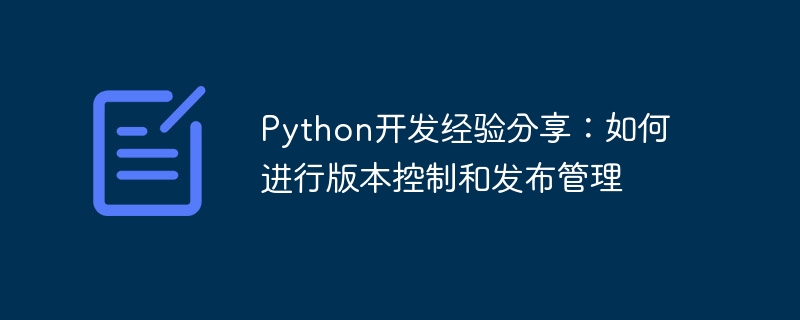Home >Backend Development >Python Tutorial >Python development experience sharing: how to perform version control and release management

Python development experience sharing: how to carry out version control and release management
Introduction:
In the Python development process, version control and release management are very important link. Through version control, we can easily track code changes, collaborate on development, resolve conflicts, etc.; and release management can help us organize the deployment, testing and release process of code to ensure the quality and stability of the code. This article will share some experiences and practices in Python development from two aspects: version control and release management.
1. Version control
Version control is a method of recording code changes. Common version control tools include Git, SVN, etc. The following are several best practices for version control:
1. Use Git for version control:
Git is currently the most widely used distributed version control system. By using Git, we can easily create code warehouses, perform branch management and merging, record the history of each code change, etc.
2. Branch management:
When using Git for version control, branch management is very important. We can create different branches to develop new features, fix bugs, etc. to avoid developing directly on the main branch and reduce code problems caused by wrong changes.
3. Code merging:
When multiple people collaborate on development, it is inevitable that multiple branches will be developed at the same time. In order to ensure the consistency of the code, it is very important to merge the code in a timely manner. You can use the merge command provided by Git to merge code from different branches into the main branch.
4. Regular submission and push:
During the code development process, it is recommended to submit and push the code to the remote warehouse frequently. This ensures code backup and timely updates for collaborative development.
2. Release Management
Release management refers to the deployment, testing and release of code after development is completed. The following are several suggestions for release management:
1. Automated deployment:
In order to improve efficiency and reduce human errors, it is recommended to use automated deployment tools, such as Fabric, Ansible, etc., for code deployment. Deployment can be automated by configuring a series of scripts or commands.
2. Continuous integration:
Continuous integration means that during the code development process, each code submission will trigger operations such as building and testing. You can use continuous integration tools, such as Jenkins, Travis CI, etc., to implement continuous integration and ensure the quality of the code.
3. Code testing:
Code testing is an indispensable part of release management. We can write unit test cases, integration test cases, etc., and conduct code testing through automated testing tools. By running test cases, potential problems can be discovered and solved in advance.
4. Version release:
When releasing a version, it is recommended to use a semantic version number to identify the version, such as MAJOR.MINOR.PATCH. At the same time, you can use packaging tools, such as setup.py, pip, Docker, etc., to package the code into a software package that can be installed and used.
Summary:
During the Python development process, good version control and release management can greatly improve development efficiency and code quality. By using Git for version control, branch management and code merging are carried out reasonably; through automated deployment, continuous integration and code testing for release management, the code deployment, testing and release process can be better organized. I hope the above experience and practice can be helpful to the majority of Python developers.
The above is the detailed content of Python development experience sharing: how to perform version control and release management. For more information, please follow other related articles on the PHP Chinese website!